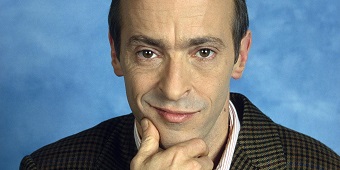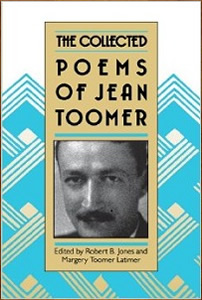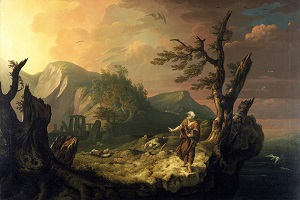Aan alle bezoekers en mede-bloggers een Prettig Kerstfeest!
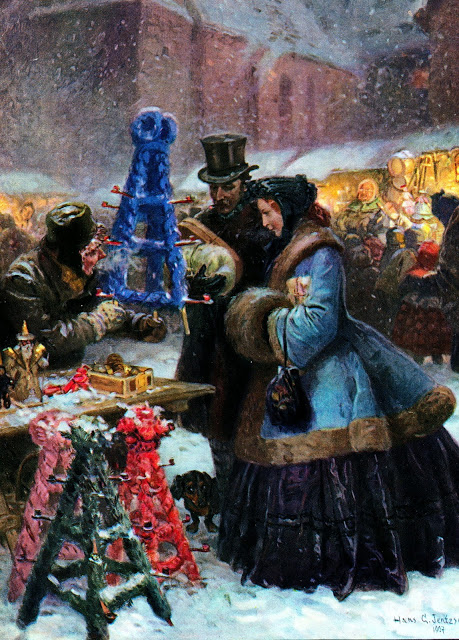
Weihnachtsmarkt door Hans G. Jentzsch, 1907
Am zweiten Weihnachtstage
[Stephanus]
Jerusalem, Jerusalem!
Wie oft erschollen ist sein Ruf;
Du spieltest sorglos unter dem
Verderben, unter Rosses Huf
Und Rades Wucht. Schau, darum ist
Verödet deine Stätte worden,
Und du ein irres Küchlein bist,
Sich duckend unter Geierhorden.
Vorüber ist die heil’ge Zeit,
Wo deine Sinne ihn erkannt;
Noch seiner Wunder Herrlichkeit
Zieht nur als Sage durch das Land.
Der Weise wiegt sein schweres Haupt,
Der Tor will dessen sich entschlagen,
Und nur die fromme Einfalt glaubt
Und mag die Opfergabe tragen.
O bringt sie nur ein willig Tun,
Ein treues Kämpfen zum Altar,
Dann wird auf ihr die Gnade ruhn,
Ein hohes Wunder immerdar.
Doch bleibt es wahr: der Gegenwart
Gebrochen sind gewalt’ge Stützen,
Seit unsren Sinnen trüb und hart
Verhüllt ward seiner Zeichen Blitzen.
War einst erhellt der schwanke Steg,
Und klaffte klar der Abgrund auf,
Wir müssen suchen unsren Weg
Im Heiderauch ein armer Hauf.
Des Glaubens köstlich teurer Preis
Ward wie gestellt auf Gletschers Höhen;
Wir müssen klimmen über Eis
Und schwindelnd uns am Schlunde drehen.
Was, Herr, du ließest fort und fort,
Hat in die Seele wohl gebrannt;
Doch bleibt es ein geschriebnes Wort,
Unsichtbar die lebend’ge Hand.
Ach, nur wo Grübeln nicht und Stolz
Am Stamme nagt seit Tag und Jahren,
Blieb frisch genug das mark’ge Holz,
Frei durch Jahrtausende zu fahren.
So ist es, wehe, schrecklich wahr,
Daß Mancher, der zum starken Mast
Geschaffen, in der Zeit Gefahr
Die Glaubenssegel hat gebraßt,
Nun dürre Säule nackt und schwer
Nur krachend kündet durch das Wehen,
Hier sei in Zweifels schwarzem Meer
Ein mächtig Schiff am Untergehen.
O sende, Retter, deinen Blitz,
Der ihm den frommen Hafen hellt,
Da einst der starke Mast als Sitz
Der Pharuslampe sei gestellt.
Es trägt Gebirge ja dein Land,
Wo Cedern sich zu Cedern einen;
Laß nicht ein Sturmlicht den Verstand
Und einen Fluch die Kraft erscheinen!
Als Stephanus mit seinem Blut
Besiegelte den Christussinn,
Da legten Mörder, heiß vor Wut,
Zu eines Jünglings Füßen hin,
Der stumm und finster sich gesellt,
Die Kleider staubig, schweißbefeuchtet:
Und der ward Paulus, Christi Held,
Des Strahl die ganze Welt durchleuchtet.
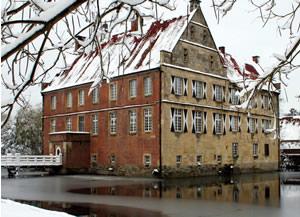
Annette von Droste-Hülshoff (10 januari 1797 – 24 mei 1848)
Winter op Burg Hülshoff, waar von Droste-Hülshoff werd geboren.
Zie voor de schrijvers van de 26e december ook mijn drie vorige blogs van vandaag.

